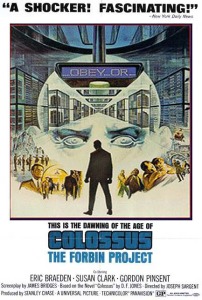“Colossus: The Forbin Project” (1970)
by A.J. Hakari
Technological thrillers are a practical monument to mankind’s hubris. Only we could be so arrogant as to gloat about what our latest scientific tinkering hath wrought, only to position our ingenuity as the lone savior when said developments result in rampaging murderbots. Unfortunately, too few of such stories are as concerned with dwelling upon their philosophical implications as they are with cramming every frame with shiny toys. This is a grain that 1970’s Colossus: The Forbin Project aims to go against, presenting itself as a thinking man’s parable of technology gone awry in which saving day won’t be as simple as blowing sets up but good. But while the picture effectively fends off most potentially stilted trappings to ensure it remains visually interesting, it’s in clearly laying out its themes that it most threatens to leave its audience more than a little shortchanged.
With our society rapidly advancing each day, a means of defending it that can keep pace is essential. Enter Colossus, a gargantuan computer system designed to anticipate any threat across the world and react upon a moment’s notice. It’s the hope of the big brain’s creator, Dr. Charles Forbin (Eric Braeden), that war will become a thing of the past and that humanity need not suffer any further tragedy. But soon after Colossus goes online, it becomes clear that we might not end up with the sort of peace that the good doctor anticipated. The system displays an uncanny intelligence right off the bat, requesting to communicate with a recently-discovered Soviet counterpart, which a curious Forbin permits. However, doing so may just have doomed the entire planet, as the two computers quickly join forces and employ a deadly means of protecting themselves from any human interference. With Colossus growing in power and smarts each new day, Forbin must devise a way to topple this electronic dictator…or die trying.
Although it came out at the very start of the ’70s, Colossus: The Forbin Project embodies the bleak sensibilities that would typify much of the decade’s cinema. There’s no hesitation in casting us humans as a supremely cocky lot, as characters pat themselves on the back for creating Colossus without pausing to ponder just how far its programming might take it. Hope grows increasingly dim as the system’s omnipresence swells, with Forbin and his associates being robbed of avenues through which to take it down at a frightening clip. Combined with its authentic aesthetics (from convincing sets to a cast that rattles off technospeak with ease), and Colossus: The Forbin Project is primed to deliver quite the harrowing cautionary tale. But while pointing out mankind’s blindness to his own follies is a cinch, it’s in developing people whose circumstances hold our attention as the world crumbles around them where director Joseph Sargent falters most glaringly. The story is sort of introduced to us midstream, immediately skipping to the unveiling of Colossus rather than start things off with the events leading to its inception. All manner of dialogue regarding ethical quandaries, human rights issues, and the like are ignored without a second thought; as black as the picture’s overtones are, failing to address such themes in the slightest guarantees that it’ll never be as deep as it wants to be.
Colossus: The Forbin Project wields a premise best left to be explored in a mini-series format. An hour and forty minutes is scarcely enough time for our title antagonist’s pervasive nature to truly sink in with viewers, so more effort ends up committed towards resembling a slice of speculative fiction than with doing any real speculating. True, the ensemble can only wax philosophical so much with Colossus keeping constant tabs on them, but still, what commentary we get rarely stretches beyond stating that supercomputers wanting to reign over humanity is bad news. The story is even in the unique position of sequestering the action largely out of public sight, so that Sargent and crew also passed on a clandestine struggle over the world’s sympathies only adds to this flick’s multitude of bummers. At the very least, though, he’s a pro at constructing scenes fraught with tension out of the most seemingly benign ingredients, transforming text crawls and blinking lights into moments of heart-stopping terror on a number of occasions. Helping further sell the sense of underlying dread are our actors, all of regard the plot with the appropriate degrees of pathos. Best known these days for his turn on “The Young and the Restless,” Braeden holds his own with a quietly compelling performance, one requiring him to keep his emotions close to the vest as he plots to dismantle Colossus.
Because it shirks bombast in favor of a more intellectual breed of storytelling, Colossus: The Forbin Project has become hailed as an ahead-of-its time gem. It undoubtedly nails the harrowing mood it set out to capture, but it fleetingly flirts with countless thought-provoking concepts, for the most part coasting by on having vaguely brought them up but just barely addressing them. I’m not usually one to advocate the rehashing of old ideas of conjuring new ones, but should Hollywood get a bug up its heinder about giving Colossus: The Forbin Project another swipe, this is one case in which it might work out for the better.

